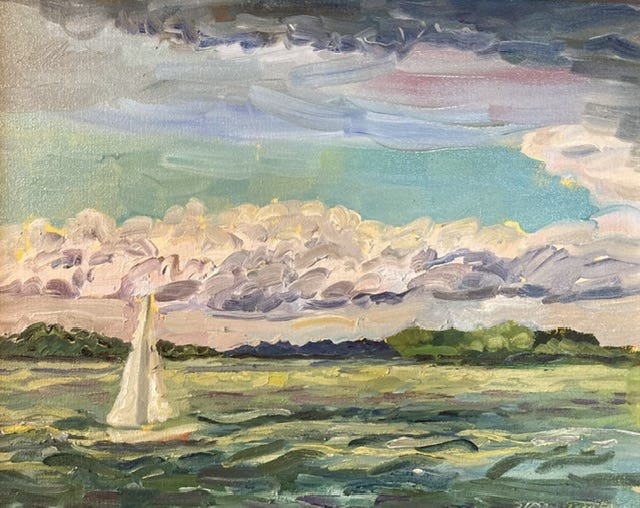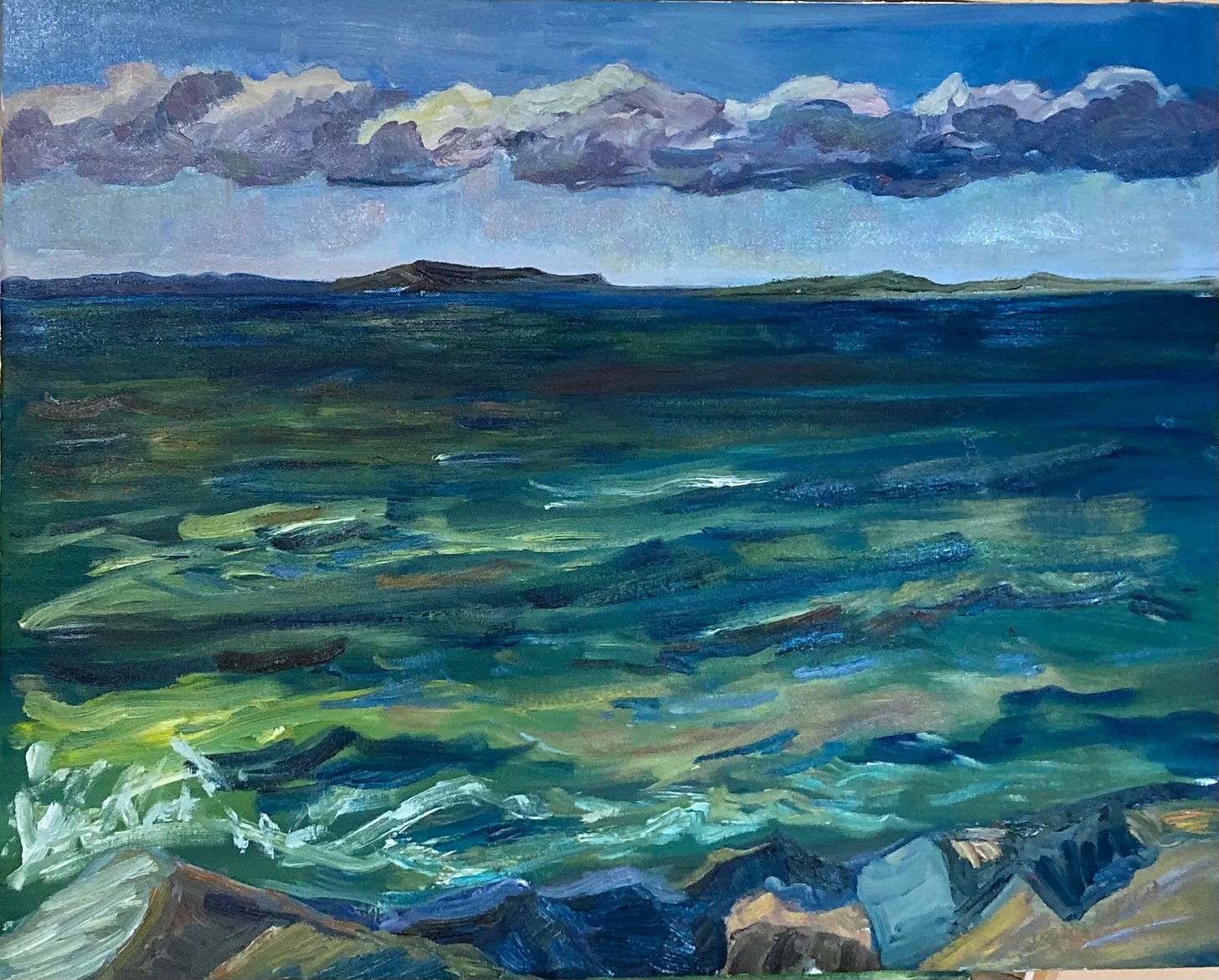Living in Uncharted Waters
Laura was Born without a Manual
Living in Uncharted Waters:
Laura was born without a Manual
Susan Fusco-Fazio
Definition: Uncharted waters are those parts of the ocean that have never been mapped, or in some cases never explored at all, which can be hazardous for sailors to navigate. Phrases such as uncharted territory or uncharted waters figuratively describe a situation that is unfamiliar or never encountered.
Paul and I likened our lives to living in uncharted waters. Laura’s medical needs were at the helm on good days and on bad days. Skies were clear and the waters were calm when Laura was not in the hospital. We basked in the ebb and flow of the best feelings life had to offer. When the clouds rolled in and the rains came in Laura was admitted to the hospital, and we were forced to leave our tranquil waters behind. When her health condition became more dire, we felt forced out to sea on an unprotected raft, where we found ourselves vulnerable and at the mercy of unpredictable currents and the fury of sudden storms. We never knew what the winds of fate might deal to us. Paul and I would say to each other, we are living in uncharted waters.
We began treading in uncharted territory when we first took our newly diagnosed baby home at 4 1/2 months old. Only trained on the “basics,” by the cardiology team, we learned how and when to administer Laura’s many heart medications, which were twice a day, every morning and every evening. Some were pills crushed and mixed in with mashed bananas, yogurt or ice-cream, others meds were given by dropper directly into her mouth. We were told what symptoms to look for, the ones that could indicate cardiac distress; labored breathing, lips getting bluer, lethargy, loss of appetite, nausea, and dizziness. On guard and on relentless watch patrol, Paul and I were thrust into a medical hot bed with absolutely no prior experience of parenting, or of tending to serious illness or navigating a complex medical system and the subculture of hospitalizations. Only equipped with limited knowledge of how to care for a healthy baby, we were without any window into caring for a child with a life threatening condition and we certainly had no prior awareness of the existence of Congenital Heart Disease.
We would come to say that Laura was born without a manual. We had no written guide for the daunting task Laura of raising a child with Congenital Heart Disease. Although it appeared to me that Laura seemed to be born with a kind of “soul knowledge,” an inborn instinct of what she needed and the ability to convey this to us. It was not a written manual, but Laura’s instincts and keen ability to communicate guided us; at first through cries, later through actions, and ultimately through words. Laura was our manual and guide, our master and our commander. She was our director, weather vane, compass, map, teacher, muse, mentor, shaman and guru. Laura was our lighthouse beacon, a buoy, an anchor, and our life boat. We came to say that, we took our cues from Laura.
Laura was born in 1986, during a time when there was little written or published on how a parent should take care of a cardiac baby or child, while at home, in school or in the hospital. There was no internet, no Google, no book in the library or a bookstore, no tangible written guides or resources on how to raise a cardiac child. To make matters even more obscure, we were only provided with medical discharge notes and directions after each surgery and hospitalization. No pamphlets were written or available at that time on how to care for your cardiac baby, only a small printed pamphlet given to us at diagnosis with diagrams and descriptions of the various congenital heart anomalies. Equipped at home with the popular parenting bible of the times, Dr. Spock’s Baby and Childcare, had only one paragraph on raising a child with congenital heart disease with a warning for parents not to give in and spoil your sick child, and to beware of manipulative behavior. The useless stack of parenting books geared toward raising a healthy child and when to expect growth and behavior milestones, became cast aside forever, leaving us to parent by intuition. We felt as if we were suspended in a surreal state of ignorant limbo. We tackled the regular tasks of parenting along with the daunting task of parenting a cardiac baby and of keeping Laura alive.
When Laura was a baby, I deciphered her cries as if they were clearly communicated sentences directing and telling me what to do. I looked at and listened to Laura closely to understand what she needed at any given time; as a baby, a toddler, a child, a preteen. I grew to discern the nuances of baby Laura’s cries; when she was hungry, tired, needed changing, holding, or when she was in pain. When Laura learned to speak, and was able to, she told us what she needed with clear words. When Laura was in the hospital, too sick to even cry or to speak, I discerned her facial expressions and body language to determine what she needed, and when I needed to advocate for more pain medications. I took my cues from Laura.
Paul and I looked toward our little girl to see what she needed at any given moment. If Laura was hungry we fed her. If she was tired we provided her with rest time. If she needed fun, we played with her. If she wanted to be silly, we got silly with her and we made each other laugh. Laura was the thermostat that set all of our moods in unison. If Laura was happy, we were happy. If she was sad, we were sad too. If Laura felt afraid, we were afraid with her. When Laura smiled at us, we smiled back at her. When Laura was upset, we did not stifle her cries or quell her tears. When Laura was angry, we let her rip with rage. We did not negate or denounce, when Laura rightly expressed these difficult emotions. We sat by her side, stayed present, and waited to comfort her when she was ready.
At home, we supervised Laura’s every waking and sleeping moment from infancy to toddlerhood, and eventually reduced our supervisory role to overseeing, when handing off responsibility to Laura’s teachers; all of us attempting not to hover while keeping her safety at the forefront of our minds. Trusting our instincts and our day to day observations, we followed her doctor's orders, put trust in her teachers, lived with faith, prayed a lot, and strived to give Laura what every child deserves, an endless supply of love and a safe and happy childhood.
~~~~~
Both Paul and I had each grown up by the sea. My childhood days were spent on a street that led to a beach on Long Island Sound, on the Connecticut shoreline. Paul’s family moved to the South Shore of Boston, not far from Hingham harbor, Nantasket Beach, and Cape Cod. Neither of us were strangers to the unpredictability of life at the seashore, its beautiful languid summers and the threat of autumn hurricanes.
I learned to swim and water ski off of the back of friends’ motor boats and took summer sailing lessons. Mostly, I strolled the pebbly beaches to collect sea glass and climbed the large craggy rocks with my siblings, and stooped down into the crevices to look for snails, minnows, and barnacles. I swam the length of the private beach when the water was calm and took daily and nightly walks to the nearby bluff just to gaze at the sea, observing and listening, and becoming in tune to its different moods. During storms and hurricanes, I snuck out of the house to brave the force of the winds to stand with sea loving neighbors close to the seawall in hopes of being kissed by the sea mist or slapped by the waves that crashed against the rocks below. I basked in the sea's different temperaments in different weather conditions and throughout the seasons, my own testament as sea lover.
Paul had his own seafaring adventures when he would go deep sea fishing for tuna on his uncle’s boat with his family. Paul grew up listening to tales of the sea from his father and uncles who spent their youthful decades as crab and lobster fisherman at T-Wharf in the North End where they lived in Boston. Years later, long after his seafaring years, when his father would complain of itchy dry skin on his legs, he would tell his children that the itching came from the sea salt still left on his skin from his years on the sea, something he said, stays with you forever. His Dad had a lifelong habit of eating a good piece of fish weekly, and the retelling of fishing stories stayed in his father’s repertoire decades after his fishing and boating days were over.
When Paul and I met at Boston College, we discovered that we both shared a deep love of the sea. It was not at all surprising to ourselves or our families that the first place we would choose to live together in was in a rented studio apartment facing the Atlantic Ocean in Cohasset, Massachusetts where we would embark on our lifelong passion of making paintings of the sea. We lived there for a few years, until a year after we were married, when I became pregnant and we moved into the house in Braintree where Laura was soon to be born.
The changing and unpredictable sea would come to be a metaphor for our lives. This dichotomy was of the sea’s beautiful serenity or the foreboding ravages of a storm, with its calm refuge turned to the threat of terror. Our lives could be cold and harsh, taken by surprise in a storm, or as glorious and sunny as a warm and languid beach day. We could just as easily be thrust back into a state of fear, limbo and chaos. Soon again we would find ourselves cozy at home in our beds, breathing sighs of relief with feelings of safety and surrender, when all was calm and well again. Life with Laura either was a treacherous storm or heaven on earth, danger or safe haven, deep sorrow and great joy. When life was good it was very good. Sometimes we breathed easily, at other times we held our breaths. There was no in between.
Like birds, we often felt the ominous feeling of impending danger. Unlike birds, we could not fly away and hide in safety until the storm passed. We would have no choice but to land back into the hospital, back into uncharted waters. Most of the time we were unaware of what was to come, so we lived in the present moment, and savored the moments when life was ordinary for us. For those were the best times, of just being home together and loving each other. Then we would smile and say that life is good, because good is when nothing happens.



